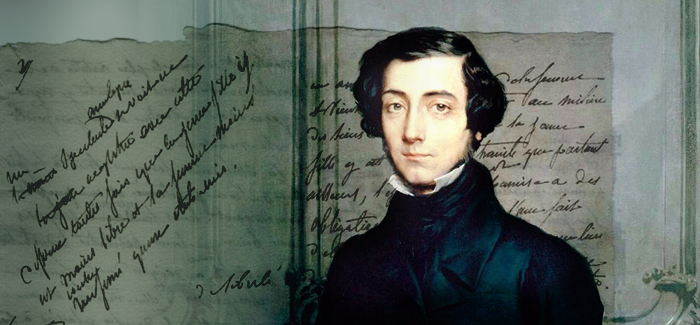Nassim Nicholas Taleb offers a great deal of wisdom: it's unfortunate that it is obscured by painting with too broad a brush.
Tocqueville Was Not a Prophet of American Doom
By the way he has been discussed recently, one might be led to think that the only thing Alexis de Tocqueville (1805-1859) wrote about was America’s decline and fall. Patrick Deneen, a Tocqueville scholar by training, recently penned a book titled Why Liberalism Failed in which he claims Tocqueville’s predictions about American moral subjectivism (“individualism”) and statist dependence on government (“soft despotism”) have come true, with corrosive effects for intermediary institutions such as religion and the family. The root of both of those errors is Americans’ love of equality, a love that suggests no authority can “tell us what to do,” so to speak. For that reason, Deneen blames the American Founding itself for fostering the idea that every individual person is “created equal” and has a natural right to “liberty.”
The truth, however, is that Tocqueville was not sure America was destined for a fall. He made many predictions in Democracy in America, basing them on how Americans were living and what he knew about the necessities of human nature. But he never claimed any of those predictions were “inevitable,” or that history necessarily was going to lead Americans from the natural rights of the Founding to the moral subjectivism of today. The late Tocqueville scholar Peter Augustine Lawler, who passed away last year at age 66, used to say that Tocqueville believed things were “getting better–and worse–all the time.”
That went for America too, despite Deneen’s and others’ attempts to paint Tocqueville purely as a pessimist. Lawler cautioned against overstressing Tocqueville’s “soft despotism” prediction; and indeed, the creation of our administrative state by Progressive leaders, sometimes against the will of a majority of the American people, does not exactly match the dire description of bureaucratic tyranny in Democracy in America. Lawler also believed that greatness could still be found in modern America, and that its spiritual resources were by no means exhausted. He even saw the stress on the natural rights of individual persons encouraged by the Declaration as a source of spiritual strength, because it bolsters the Christian awareness of God’s personal and Trinitarian nature.[1] Lawler argued such things not because he was an optimist, but because of what he knew about Tocqueville. To be a true Tocquevillian today involves more than just being a prophet of doom.
Tocqueville once mentioned in a letter two authors he read every day for inspiration.[2] One was the historicist political philosopher and French-revolution inspirer Jean Jacques Rousseau (1712-1778); the other was the philosopher and probability theorist Blaise Pascal (1623-1662). One might ask: which author was more important to Tocqueville, Rousseau or Pascal?[3]
Lawler argued that the Christian philosophy of Pascal was far and away Tocqueville’s most important influence. Tocqueville explicitly rejected Rousseau’s ideas about historical determinism because he held to the Christian truths about free will and responsibility. Even the ideas that Tocqueville did accept from Rousseau were appropriated from Pascal, Lawler argued. Lawler’s book The Restless Mind: Alexis de Tocqueville on the Origin and Perpetuation of Human Liberty (1993) lays out the many ways Pascal’s ideas can be found in Tocqueville and why Pascal is the key to understanding him. So it’s helpful to cite some passages where Lawler clearly puts the Pascalian Tocqueville into conversation with other thinkers. Page numbers refer to passages in The Restless Mind:
-(128): “The movement toward democracy is human progress and is just because it reveals that all human beings have some greatness about them. Their minds, as we have seen, have all become restless. They have discovered, as Pascal describes, the misery of man without God… The American spectacle is evidence, contrary to the prideful prejudices of aristocrats, that Christianity is in some sense true… All Americans are capable of feeling human misery and manifesting human liberty. They all have souls.”
-(159): “[Current liberals] do not make it clear enough that the revolution of 1989 should be viewed as a defeat, at least for now, of all Rousseau-inspired projects to eradicate the restless disorder of human individuality on behalf of security or contentment. They do not make the connection Tocqueville does between Pascal’s description of human misery and Rousseau’s misanthropy.”
-(170): “[Francis] Fukuyama contends that the time of both Christianity and the revolution have come to an end… he finds human beings today completely recognized in their freedom, and apparently without any genuine desire for immortality. But we must observe, with Tocqueville, that, whatever the reason, the Americans and Europeans hardly seem satisfied. Even Fukuyama refuses to say that historical progress has made them happy. They seem particularly anxious and restless, and not only about their comfortable self-preservation or their status as citizens. Their many forms of status anxiety flow from the individualistic disorder of their souls… Today’s dissatisfaction, Pascal and Tocqueville would say, is most of all with the human condition as such.”
Pascal’s emphasis on the restless character of human beings, generated by the angelic and bestial sides of our nature and the lonely awareness that our earthly existence is finite, can be found beneath the surface of nearly everything Tocqueville wrote. As Lawler puts it, “Tocqueville follows Pascal in showing that the need for faith is at the core of man’s greatness. He knows that ‘the incomplete joys of this world will never satisfy the heart’” (144). These elements can be seen in Democracy in America, but are even more evident in Tocqueville’s angst-filled recollections on the Paris social uprising of 1848, Souvenirs. One terrific feature of Peter’s book The Restless Mind is that he takes the opportunity to compare the 1989 overthrow of Communist dictatorship in Eastern Europe to France’s 1848 uprising. Tocqueville would have seen these two revolutions as similarly great, because they flushed socialism out of the body politic and allowed for a truer liberty for individuals. It also allowed great democratic leaders such as Vaclav Havel the opportunity to shine.
As many of us now find ourselves asking “What would Peter Lawler say?” about any number of people and events, we ought to recognize that the question Lawler himself was asking was “What would Pascal say?” Of course, Peter wouldn’t have said it exactly that way. But his insightful posts on blogs such as National Review, Law and Liberty, and Big Think, were always searching for the kind of greatness the Pascal-inspired Tocqueville lived to discover. Some of what Lawler pointed out as “great” may be interpreted by Deneen as the mere residue or remnant of Christian culture in America. But we shouldn’t forget that that Christian remnant is an extremely American Christian remnant if that’s what it is, its greatness can’t be considered apart from its natural home in our restless America.
Greatness in this sense is anything truly extraordinary and divine that can be found in the human realm; it is “openness to the truth, disinterestedness or personal integrity, an ability to comprehend human distinctions, ‘elevation of the spirit’ or breadth of soul, political passion, courage, and a willingness and ability to take responsibility for the most weighty, primarily political, matters” (113). These are the qualities of greatness Lawler was looking for in the seemingly mundane (though always somewhat nutty) corners of American life: at Waffle House and Panera Bread, in Walmart, on TV shows like Friday Night Lights, at movies such as MUD and American Sniper, and in soul-filled Southern music. These are the qualities of greatness that other Pascal-inspired thinkers look for, even (and especially) amidst ugliness: the Flannery O’Connor’s, Charles Portis’s and Walker Percy’s whom Lawler loved so much. In Tocqueville’s sense of the term, Peter Lawler’s project was to show how to make America “great” again.[4]
[1] See Peter Lawler and Richard Reinsch, “Freedom and the Human Person,” National Affairs (Fall 2014).
[2] Letter to Kergorlay, November 10, 1836.
[3] This is the question about Tocqueville that Thomas G. West ends with, and Peter Lawler begins with. West provides the best critiques of Democracy in America from an American perspective. See “Misunderstanding the American Founding” in Interpreting Tocqueville’s Democracy in America, ed. Ken Masugi. Savage, Md: Rowman and Littlefield, 1991. p177.
[4] Special thanks to Carl Eric Scott for his recent review of our friend Peter’s book , which inspired me to do a close reading of The Restless Mind. “How Lawler’s Understanding of Tocqueville Helped Me Understand Myself,” Perspectives on Political Science (2018).Vol. 47, No. 1. p21-24.


